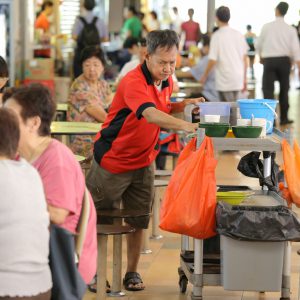Singapore’s poorest earners will benefit from expansion of Progressive Wage Model but some conditions must be met
October 21, 2020

The Progressive Wage Model (PWM) was introduced in 2012 and aimed to improve the wages and working conditions of the Cleaning, Security, and Landscaping sectors that encompass the bottom 20% of Singapore’s income earners. Implementation by the MOM came three years later, in September 2015 for Cleaning and Security and July 2016 for landscaping, with the PWM requirements becoming mandatory and covering all Singaporeans and Permanent Residents.
Professor Linda Lim (University of Michigan) and Associate Professor Irene Ng (NUS Social Work) argue that more needs to be done, analysing problems within the current framework and providing suggestions for improvement and reform in ‘Singapore’s poorest earners will benefit from expansion of Progressive Wage Model but some conditions must be met,’
(CNA, 2020).
Too Little, Too Late: In 2013, Singapore’s low-wage workers earned on average 25-50% of what low-wage workers earned in European countries such as the Netherlands, Sweden and Denmark. Prof Lim and A/P Ng show that since 2012 the average annual increase in lowest-paid category workers has been 3.4%, and was actually lower than the 3.9% average annual increase of the highest earning occupational categories in Singapore. Although the PWM mandate has improved wages, low-paid Singaporeans still suffer in real wage growth compared with other developed nations.
Additionally, despite recent announcements from Deputy Prime Minister Heng that the PWM will be extended to additional sectors such as retail, F&B, and non-therapeutic health, the speech to Parliament and subsequent press releases were lacking in detail and a timeline for implementation.
Prof Lim and A/P Ng recommend three complementary policies to strengthen the core motivations behind the PWM:
(1) A reduction in the supply of low-wage foreign labour;
(2) The continuation of wage and income subsidies such as Workfare Income Supplement;
(3) Expanded social protections for the elderly and stronger protection of safe working conditions
Potential exploitation of PWM needs to be mitigated, so as to not negatively affect the very workers that the policy was intended to protect. The proposal to reduce foreign labour stems from the reality that the PWM only applies to Singaporeans and Permanent Residents. Therefore, a natural consequence for employers seeking to cut costs would be to hire foreign workers who do not have to be paid equitably. Prof Lim and A/P Ng concede that while harmonisation of PWM to also cover foreign workers would be economically desirable, politically it is highly unlikely to occur.
The article ends with a strong message that the lifestyle that many Singaporeans enjoy today, particularly among the most fortunate, should not be subsidised by the low wages of their less fortunate countrymen. Singapore, as an established wealthy nation, needs to raise minimum wages for its own rather than shifting responsibility and simply hiring more foreign workers.
Read the full article here.
